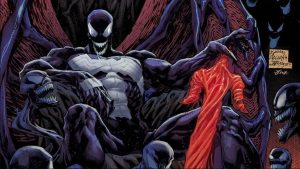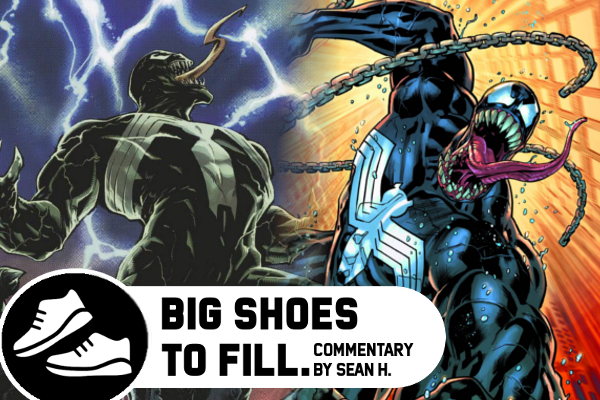 Here at Graham Crackers Comics St. Charles, I have made no secret of my love for Donny Cates and Ryan Stegman’s Venom run. Simply put, I think it’s the best book Marvel has made since 2010. That’s not an insult to anything else they’ve put out, it’s just reflective of how good that run was. In a little under 50 issues, counting events and one-shots, they not only redefined the character, having Eddie Brock mature and develop into something more sophisticated and human than he perhaps has ever been, but also firmly pulled him out of Spider-Man’s long shadow and made the Venomverse a compelling corner of the Marvel Universe all its own. I can, and have, recommended that series to people who’ve never read a comic book before in their life, because it’s just that good, and more often than not it hooks them. All future runs on the character will have to reckon with that formidable legacy.
Here at Graham Crackers Comics St. Charles, I have made no secret of my love for Donny Cates and Ryan Stegman’s Venom run. Simply put, I think it’s the best book Marvel has made since 2010. That’s not an insult to anything else they’ve put out, it’s just reflective of how good that run was. In a little under 50 issues, counting events and one-shots, they not only redefined the character, having Eddie Brock mature and develop into something more sophisticated and human than he perhaps has ever been, but also firmly pulled him out of Spider-Man’s long shadow and made the Venomverse a compelling corner of the Marvel Universe all its own. I can, and have, recommended that series to people who’ve never read a comic book before in their life, because it’s just that good, and more often than not it hooks them. All future runs on the character will have to reckon with that formidable legacy.
 Which brings us to Al Ewing, current writer of Venom. I’ve likewise made no secret that I don’t care for Al Ewing as much as others seem to. I find him to be someone who almost always has good ideas, but is hit or miss on their execution. So, when he (alongside Ram V, now departed for greener pastures) was announced as the new creative team for Venom, I was skeptical. After all, the ending for Cates’ Venom was so perfect and satisfying, concluding Eddie’s story and leaving the door open for Dylan Brock to take the mantle of his father, now in a mentor role. My great concern was that Ewing would not deliver on the potential of that concept. To my pleasant surprise, he instead has thus far vastly exceeded my expectations, by providing a solid follow-up, and building upon the foundation laid down by Cates and Stegman. Go read it. It’s a good time.
Which brings us to Al Ewing, current writer of Venom. I’ve likewise made no secret that I don’t care for Al Ewing as much as others seem to. I find him to be someone who almost always has good ideas, but is hit or miss on their execution. So, when he (alongside Ram V, now departed for greener pastures) was announced as the new creative team for Venom, I was skeptical. After all, the ending for Cates’ Venom was so perfect and satisfying, concluding Eddie’s story and leaving the door open for Dylan Brock to take the mantle of his father, now in a mentor role. My great concern was that Ewing would not deliver on the potential of that concept. To my pleasant surprise, he instead has thus far vastly exceeded my expectations, by providing a solid follow-up, and building upon the foundation laid down by Cates and Stegman. Go read it. It’s a good time.
Now you’re probably asking yourselves what my point is here, besides lathering praise on one of my favorite books. Well, it’s the most relevant example of one of the great challenges in comic books, and indeed in any ongoing serialized entertainment, which is follow through. Take a moment to sympathize with the poor writers and artists who have to follow up when the previous team hits it out of the park. It is an unenviable task. They have to walk a very fine line between fan expectations, editorial oversight, and of course their own creative aspirations if they want to succeed. It’s not an exact science, these three things are often in direct opposition to one another, and more often than not creators are unable to maintain that tricky balancing act and end up falling far short of their beloved predecessors, which will then be hung over them for the rest of eternity because the internet never forgets.
Case in point: Amazing Spider-Man. If you’re a regular reader of these emails, you’ll know that our intrepid reviewers do not regard the current Amazing Spider-Man run particularly fondly and I know they’re not alone in that. I most definitely do not care for it, having adored Nick Spencer’s time on the title, but in the interest of avoiding the wrath of my own editor, I’m going to refrain from being too acerbic in my criticism of the current book and focus on how it ties into what I said above. If ASM were walking the tightrope above the three-ring circus I mentioned (fan expectation, editorial oversight, creative aspiration), then it would have fallen straight off and landed in the editorial oversight circle, missing the other two entirely. In the case of Venom, they’ve managed to thread the needle nicely and maintain relatively good standing. You can’t please everyone of course, it’s not an exact science, but generally if you can balance those three factors (no small task) after you’ve taken over from a wildly successful run, it will tend to work out better.
That’s all for now.
Be sure to let us know what comic runs you thought held up their legacy in the comments!


